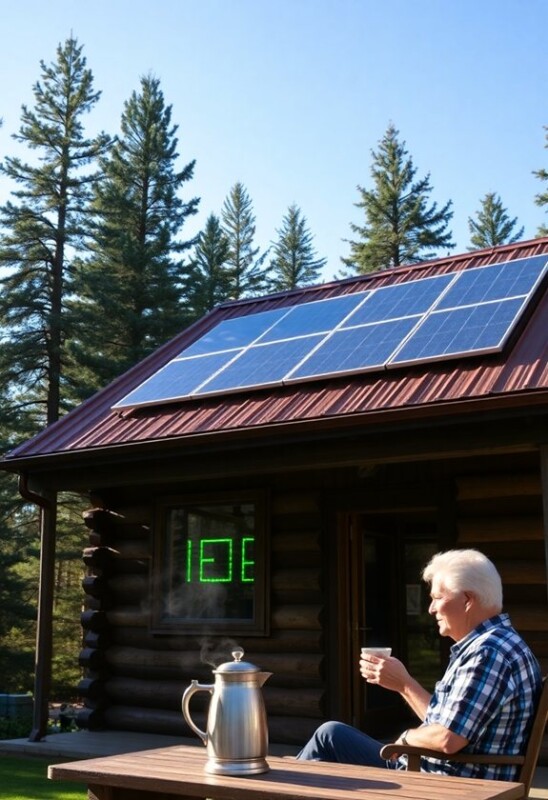Solar power gives you true energy independence and complete control over your power supply while living off-grid. You’ll eliminate monthly utility bills, reduce your carbon footprint considerably, and protect yourself from grid vulnerabilities during emergencies. With modern panels being 50% more efficient than older models and battery storage solutions, you can power your entire home sustainably anywhere you choose to live. The benefits of solar extend far beyond basic electricity generation.
Key Takeaways
- Solar power with battery storage provides complete energy independence, eliminating reliance on traditional power grids and utility companies.
- Off-grid solar systems enable sustainable living in remote locations where traditional power infrastructure is unavailable or impractical.
- Modern solar technology offers reliable power generation with 50% more efficiency than older models, ensuring consistent energy supply.
- Solar installations with battery backup maintain critical power during emergencies and natural disasters when grid systems fail.
- Initial solar investment pays back within 1-4 years while eliminating monthly utility bills and qualifying for substantial tax incentives.
The Freedom of Energy Independence
While traditional power grids keep you tethered to utility companies, solar power systems offer a path to true energy independence.
You’ll achieve complete energy autonomy through a combination of solar panels and battery storage, enabling you to power your home regardless of external circumstances.
Grid freedom means you’re no longer subject to rising utility costs or service interruptions.
Your solar setup allows you to thrive in remote locations without traditional infrastructure, while battery backup systems guarantee reliable power during nighttime and overcast conditions.
You’ll gain control over your energy production and storage, eliminating vulnerability to grid failures and maintenance issues.
Cost Savings Beyond the Power Bill
Although the elimination of monthly utility bills represents the most obvious financial benefit, off-grid solar systems release numerous supplementary cost-saving opportunities.
You’ll benefit from substantial government incentives, including a 26% federal tax credit and a variety of state rebates, strengthening your financial planning strategy.
The minimal maintenance requirements and durability of solar components greatly reduce your long-term energy budgeting needs.
Furthermore, your property value could increase by $15,000 or more, while you’ll avoid the rising costs associated with traditional power infrastructure.
These combined advantages make solar power an economically sound investment for off-grid living.
Environmental Impact and Sustainability
Since shifting to solar power represents one of the most impactful environmental decisions you can make, understanding its full sustainability profile is crucial.
A lifecycle analysis reveals that solar emissions are just 40g CO₂/kWh compared to coal’s 1,000g CO₂/kWh, making it considerably cleaner for off-grid living.
- Your solar system’s energy payback period is only 1-4 years
- You’ll reduce CO₂ emissions 208-236 times more than forests per acre annually
- Modern panels are 50% more efficient than older models
- You’re supporting closed-loop material recovery through recycling programs
These environmental benefits make solar power an ideal choice for sustainable off-grid living.
Remote Living Made Possible
As remote regions worldwide struggle with limited grid access, solar power systems are revolutionizing off-grid living possibilities. You’ll find that solar technology provides crucial services in rural areas where 84% of unelectrified populations reside, enabling independent power generation for your daily needs.
Through rural electrification initiatives, you can power your home’s lighting, communication devices, and refrigeration without depending on traditional grid infrastructure.
Solar technology’s versatility extends beyond individual homes, powering community facilities like schools, clinics, and water systems. You’re no longer constrained by grid limitations – solar systems offer you reliable, sustainable power wherever you choose to live.
Resilience During Natural Disasters
When natural disasters strike and conventional power grids fail, solar power systems prove invaluable for maintaining critical services and community resilience. Your investment in solar technology improves disaster preparedness while ensuring energy reliability during emergencies.
Smart microgrids and battery storage systems keep your power flowing when you need it most.
- You’ll maintain power independence with portable solar generators for immediate deployment
- Your critical systems stay operational through integrated battery backup
- You’re protected from grid vulnerabilities with hardened solar installations
- You’ll support emergency response efforts with reliable, clean energy
These resilient systems have demonstrated their effectiveness during hurricanes, earthquakes, and other natural disasters, keeping communities powered when traditional infrastructure fails.
System Components and Setup Basics
Understanding your solar power system‘s core components is essential for successful off-grid living.
You’ll need properly sized solar panels to capture sunlight, converting it to DC electricity through photovoltaic cells. A charge controller regulates voltage to protect your batteries, while the battery bank stores energy for nighttime use. Your inverter transforms stored DC power into AC electricity for your appliances.
System sizing and component selection depend on your daily energy needs. Choose high-efficiency monocrystalline panels, MPPT charge controllers, and pure sine wave inverters for peak performance.
Consider your location’s solar irradiance and seasonal variations when planning your setup.
Government Incentives and Tax Benefits
Numerous financial incentives make solar power systems more affordable for off-grid living.
You’ll find substantial federal incentives through 2032, offering a 30% tax credit on your total system costs, including battery storage. State programs provide extra savings through rebates, tax credits, and performance-based incentives.
- Claim the federal tax credit even if your system isn’t grid-connected
- Access state-specific rebates ranging from $2,500 to $7,500
- Earn ongoing income through SREC sales in qualifying states
- Combine multiple incentives to enhance your return on investment
Remember to verify current programs through the DSIRE database, as incentives can change based on location and eligibility requirements.
Conclusion
Going off-grid with solar power isn’t just about unplugging from the system – it’s your pathway to energy autonomy and environmental stewardship. You’ll reduce your carbon footprint while building resilience against power outages and rising utility costs. With today’s advanced technology and available incentives, you’re well-positioned to make the switch. Your investment in solar power today guarantees a sustainable, independent energy future.



